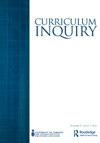“他是同性恋吗?”这就是“我想知道的一切”:好奇心、真实性和认识论
IF 1.6
3区 教育学
Q2 EDUCATION & EDUCATIONAL RESEARCH
引用次数: 0
摘要
摘要作为美国中西部城市一所综合公立高中为期一年的大型民族志的一部分,本文探讨了该校“性别与性联盟”旗下一家读书俱乐部的一个生动案例。将课程视为教育中重视哪些知识的问题,在这篇文章中,我描述了读书俱乐部中的年轻人共同构建的认知实践的层次,以及这些实践对性、性别、种族、民族和语言等压迫性价值观的影响。这个故事讲述了年轻人谈论年轻成年作家Sáenz的性取向,他的小说《亚里士多德和但丁发现宇宙的秘密》,以及(文学)作者的身份是否以及如何影响他们的(文学)写作。我对这个案例的分析探讨了与文学、好奇心、真实性、#OwnVoices和作者-读者关系有关的认识论现象,我通过关于认识论、透明度和不透明性的批判性,特别是酷儿和跨性别的理论视角来考虑这些现象。这些发现对致力于破坏压迫性、反LGBTQ的教育工作者有启示+ 学校中的认识论,以鼓励将好奇心人性化,促进同情心,并在LGBTQ中和为LGBTQ培养快乐+ 学生。本文章由计算机程序翻译,如有差异,请以英文原文为准。
“Is he gay? That’s like, all I want to know”: Curiosity, authenticity, and epistemology in a GSA bookclub
Abstract Part of a larger yearlong ethnography at a comprehensive, public high school in a Midwestern city in the United States, this article explores a telling case from a bookclub that was part of the school’s Genders and Sexualities Alliance. Approaching curriculum as a question of what knowledges are valued in education, in this article I describe the layers of epistemic practices that youth in the bookclub co-constructed and the consequences of these practices for oppressive values with respect to sexuality, gender, race, ethnicity, and language. The telling case features youth talking about young adult author Sáenz’s sexuality, his novel Aristotle and Dante Discover the Secrets of the Universe, and whether and how (literary) authors’ identities affect their writing (of literature). My analysis of the case explores epistemological phenomena related to literature, curiosity, authenticity, #OwnVoices, and author–reader relationships, which I consider through critical, especially queer and trans, theoretical perspectives about epistemology, transparency, and opacity. The findings have implications for educators working to disrupt oppressive, anti-LGBTQ+ epistemologies in schools in an effort to encourage humanizing curiosity, promote compassion, and foster joy among and for LGBTQ+ students.
求助全文
通过发布文献求助,成功后即可免费获取论文全文。
去求助
来源期刊

Curriculum Inquiry
EDUCATION & EDUCATIONAL RESEARCH-
CiteScore
3.10
自引率
17.60%
发文量
37
期刊介绍:
Curriculum Inquiry is dedicated to the study of educational research, development, evaluation, and theory. This leading international journal brings together influential academics and researchers from a variety of disciplines around the world to provide expert commentary and lively debate. Articles explore important ideas, issues, trends, and problems in education, and each issue also includes provocative and critically analytical editorials covering topics such as curriculum development, educational policy, and teacher education.
 求助内容:
求助内容: 应助结果提醒方式:
应助结果提醒方式:


